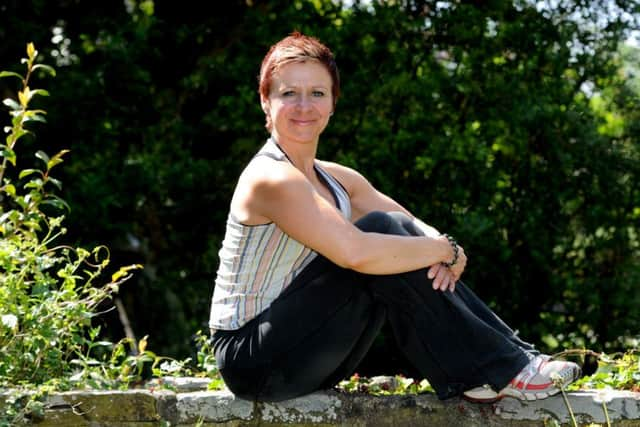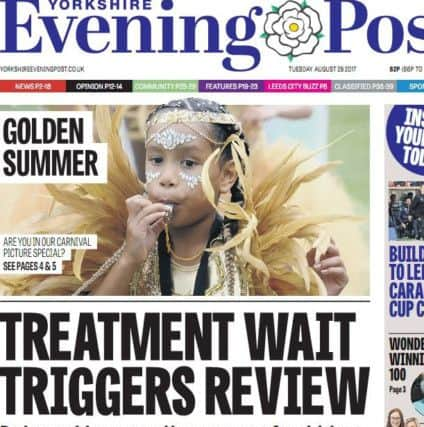Leeds mum brands breast cancer waiting list delays as '˜unimaginable'
and live on Freeview channel 276
Tracey Barraclough, 58, of Calverley, had mastectomy and hysterectomy after she was diagnosed with the faulty gene, BRCA1.
The gene put her at high risk of developing the breast and ovarian cancer which had affected her mother, grandmother and great-grandmother.
Advertisement
Hide AdAdvertisement
Hide AdLast year, she was diagnosed with bowel cancer - totally unrelated to the BRCA1 gene - which was successfully treated with surgery but she told the YEP, the wait for information as to whether she had cancer was terrifying.


“It’s like waiting for a death sentence,” she said.
Tracey was speaking out after the YEP revealed in yesterday’s paper that patients across West Yorkshire suspected of having breast cancer have been facing major delays in seeing specialists at top hospitals in the region.
Four out of five patients in Leeds, between April and June this year, failed to see anyone within the 14-day NHS deadline after being urgently referred with suspicious symptoms.


The delays were the second worst in England, behind only hospitals in Essex, where one in ten were given tests within the two weeks.
The NHS Trust in Lincoln also performed poorly.
Advertisement
Hide AdAdvertisement
Hide AdTracey said: “It’s unimaginable and scary to think there are these waiting lists.
“It’s not what people need to hear. It’s a worry. Heaven knows how women must feel reading this and knowing about it. They’ll be in fear.
“It’s such a frightening thing, being faced with your own mortality.
“We know we all have to die, but being faced with your own mortality is scary.
Advertisement
Hide AdAdvertisement
Hide Ad“I knew I had got cancer. It was because of my persistence that I was finally heard.
“No-one knows your body like yourself. We know.
“I knew, I absolutely knew and it’s very frightening.”
She said it’s “vital” that NHS bosses get on top of the waiting list and help diagnose people as early as possible.
“It’s absolutely key. I speak from seeing friends with it as well as everything I know about it and personally as well. Early detection is key.”
The boss of a breast cancer charity which has a base in Leeds has said the waiting list situation in West Yorkshire is “unacceptable”.
Advertisement
Hide AdAdvertisement
Hide AdDr Caroline Hoffman, clinical and research director of the national charity Breast Cancer Haven, which has a centre in Leeds, said: “Discovering that you could have breast cancer is stressful enough without the added worry of having to wait longer than necessary to see a specialist.
“Clearly this is an unacceptable situation for people in West Yorkshire who will want to know as much as possible, as soon as possible, about their diagnosis and what sort of impact it will have on their lives.
“I am sure that our NHS colleagues are doing everything they can under very difficult and challenging circumstances. However, this clearly needs to be remedied as soon as possible so people are spared this unnecessary stress and anxiety.
“Breast Cancer Haven is on hand to help anyone that has been affected by these delays.”
Advertisement
Hide AdAdvertisement
Hide AdSuzanne Hinchliffe, chief nurse and deputy chief executive at Leeds Teaching Hospitals NHS Trust, told the YEP yesterday that the “longer than normal” waiting times were due to a number of reasons including, a small increase in demand, difficulty recruiting into specialist areas of the service and sickness within the team.
She added: “We have worked hard to address all of these and waiting times within the breast service have now significantly improved.”
**The waiting list figures for West Yorkshire has triggered an urgent review into breast services across the region.
The figures showed more than 1,000 patients in Leeds waited beyond the official 14-day NHS deadline in the three months to June.
Advertisement
Hide AdAdvertisement
Hide AdA total of 319 patients waited between three and four weeks for specialist appointments, after being urgently referred with suspicious symptoms.
And 51 patients faced waits of more than 28 days.
The national target is 93 per cent of patients seen within 14 days.
